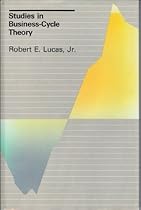Studies in Business-Cycle Theory

| Author | : | |
| Rating | : | 4.45 (848 Votes) |
| Asin | : | 0262120895 |
| Format Type | : | paperback |
| Number of Pages | : | 300 Pages |
| Publish Date | : | 0000-00-00 |
| Language | : | English |
DESCRIPTION:
"great collection by the leading macroeconomist of our time" according to M. Lucas is a wonderful writer, but here and elsewhere he's aiming at PhD students and above. If you're one of those, this contains some classics. "Econometric policy evaluation" is a personal favorite. The less mathematical essays are engaging in a different way, touching on how the field of macroeconomics has changed since the 1920s, in part because we have better tools than we used to. Here I'd say "Methods and problems" is the highlight. "Review. Truly exceptional A Customer The book includes articles that at this moment have become classical in economic theory. Being written by the leader of new classical economics this book helps one to enter the world of rational expectations macroeconomics.. Lucas simply assumes that the time series data is normally distributed This is one of the worst books ever written by an economist.Lucas simply assumes that all markets can be represented by normal probability distributions(joint,bivariate,multivariate, or log normal).He uses his magic wand to proclaim that there is no such thing as uncertainty or,if there is,it is impossible to analyze.Lucas has never done any type or kind of goodness of fit test on the time series data he claims that his theory is representing/ana
An article in Fortune a few years ago identified Robert Lucas as "the intellectual leader of the rational-expectations school." An academic colleague has called Lucas "the dominant figure in American macroeconomics." And another refers to this group of 14 essays, nearly all of which were first published during the 1970s, as the most influential contribution to macroeconomics in that decade.This volume includes: Real Wages, Employment, and Inflation (with Leonard A. Prescott); An Equilibrium Model of the Business Cycle; Understanding Business Cycles; Unemployment Policy, Rules, Discretion, and the Role of the Economic Advisor a
